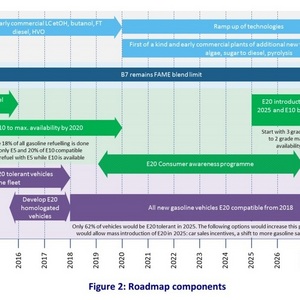Report evaluates role of biofuels in EU transport sector

E4tech, “A harmonised Auto-Fuel biofuel roadmap for the EU to 2030�
December 3, 2013
BY Erin Krueger
Consulting firm E4tech has published a report that shows biofuels and vehicle efficiency will be essential in helping the European transportation sector reduce greenhouse gas (GHG) emissions and meet its decarbonizations targets. The report, titled “A harmonised Auto-Fuel biofuel roadmap for the EU to 2030,” was commissioned by a consortium of Daimler, Honda, Neste, OMV, Shell and Volkswagen.
The report details what could be achieved in terms of a sustainable biofuel supply, and how that fuel can be integrated into the vehicle fleet. According to the study, biofuels could deliver a 12-15 percent energy contribution to transport fuel and 8 percent reduction in GHG emissions of the road transport sector by 2030. In addition, the analysis shows that advanced biofuels could grow to comprise at least 20 percent of the biofuels market by 2030, and that the potential for biofuels could be even greater beyond 2030.
The report makes several policy recommendations to support the use of biofuels and the decarbonization of transportation. First, the analysis calls for a coherent and overarching 2030 road transport policy to form the core of the European Union’s sustainable transport strategy. That framework should be based on sound evidence and include supporting measures for the development of required fuel and vehicle technologies and related infrastructure. The report also said the framework should be built on a roadmap for biofuels deployment and include a policy framework for sustainable feedstocks. In addition, the report specifies that advanced biofuels should play a major role and be supported by a dedicated funding program and initiatives enacted on the member state level. The policy should recognize the benefit of drop-in biofuels and include a program to ensure motorists have access to timely, accurate information to inform their purchasing decisions.
“There is a clear lack of understanding of what biofuels could accomplish in European road transport towards 2030. For the first time we have analyzed in detail what can be achieved in terms of sustainable biofuels supply – and critically, how this can be integrated affordably and smoothly into the vehicle fleet,” said Ausilio Bauen, director of E4tech. “On this basis we have set out a vision and roadmap of how the auto and fuel industries can jointly achieve a 15 percent energy contribution from biofuels by 2030. This will now require broader stakeholder and policy buy-in.”
Advertisement
Advertisement
A full copy of the study can be downloaded at the EU Auto-Fuel website
Advertisement
Advertisement
Related Stories
The U.S. EPA on July 8 hosted virtual public hearing to gather input on the agency’s recently released proposed rule to set 2026 and 2027 RFS RVOs. Members of the biofuel industry were among those to offer testimony during the event.
The U.S. exported 31,160.5 metric tons of biodiesel and biodiesel blends of B30 and greater in May, according to data released by the USDA Foreign Agricultural Service on July 3. Biodiesel imports were 2,226.2 metric tons for the month.
The USDA’s Risk Management Agency is implementing multiple changes to the Camelina pilot insurance program for the 2026 and succeeding crop years. The changes will expand coverage options and provide greater flexibility for producers.
President Trump on July 4 signed the “One Big Beautiful Bill Act.” The legislation extends and updates the 45Z credit and revives a tax credit benefiting small biodiesel producers but repeals several other bioenergy-related tax incentives.
CARB on June 27 announced amendments to the state’s LCFS regulations will take effect beginning on July 1. The amended regulations were approved by the agency in November 2024, but implementation was delayed due to regulatory clarity issues.
Upcoming Events










